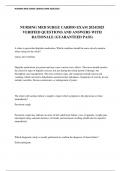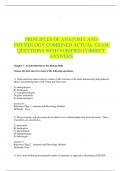NURSING MED SURGE CARDIO EXAM 2024/2025
NURSING MED SURGE CARDIO EXAM 2024/2025
VERIFIED QUESTIONS AND ANSWERS WITH
RATIONALE (GUARANTEED PASS)
A client is prescribed digitalis medication. Which condition should the nurse closely monitor
when caring for the client?
nausea and vomiting
Digitalis medications are potent and may cause various toxic effects. The nurse should monitor
the client for signs of digitalis toxicity, not just during the initial period of therapy, but
throughout care management. The most common signs and symptoms include nausea and
vomiting which can lead to dehydration and electrolyte imbalance. Symptoms of toxicity do not
include vasculitis, flexion contractures, or enlargement of joints.
The client with cardiac failure is taught to report which symptom to the physician or clinic
immediately?
Persistent cough
Persistent cough may indicate an onset of left-sided heart failure. Loss of appetite, weight gain,
interrupted sleep, unusual shortness of breath, and increased swelling should also be reported
immediately.
Which diagnostic study is usually performed to confirm the diagnosis of heart failure?
Echocardiogram
,NURSING MED SURGE CARDIO EXAM 2024/2025
An echocardiogram is usually performed to confirm the diagnosis of heart failure. ECG, serum
electrolytes, and a BUN are usually completed during the initial workup.
The nurse is administering nitroglycerin, which he knows decreases preload as well as afterload.
Preload refers to which of the following?
The amount of blood presented to the ventricles just before systole
Preload is the amount of blood presented to the ventricles just before systole. It increases
pressure in the ventricles, which stretches the ventricle wall. Like a piece of elastic, the muscle
fibers need to be stretched to produce optimal recoil and forceful ejection of blood. Afterload
refers to the amount of resistance to the ejection of blood from the ventricle. To eject blood, the
ventricles much overcome the resistance caused by tension in the aorta, systemic vessels, and
pulmonary artery.
The Cardiac Nurse Clinician is teaching a group of clients with heart failure about self-
management of their disease. What dietary advice should the Nurse Clinician give to clients with
severe heart failure until edema resolves?
Avoid the intake of processed and commercially prepared foods.
Until edema resolves, a client with severe heart failure requires restriction of sodium to 500 to
1,000 mg/day. Therefore, processed and commercially prepared foods are eliminated. Vegetables
with natural sodium, for example, beets, carrots, and "greens," should be avoided. Fresh, frozen,
and canned fruit and fruit juices are not restricted. Increased intake of red meat should not be
encouraged; it should be restricted to 6 oz per day.
The nurse identifies which symptom as a characteristic of right-sided heart failure?
,NURSING MED SURGE CARDIO EXAM 2024/2025
Jugular vein distention (JVD)
JVD is a characteristic of right-sided heart failure. Dyspnea, pulmonary crackles, and cough are
manifestations of left-sided heart failure.
A client has been experiencing increasing shortness of breath and fatigue. The health care
provider has ordered a diagnostic test in order to determine what type of heart failure the client is
having. What diagnostic test does the nurse anticipate being ordered?
An echocardiogram
Increasing shortness of breath (dyspnea) and fatigue are common signs of left-sided heart failure
(HF). However, some of the physical signs that suggest HF may also occur with other diseases,
such as renal failure and chronic obstructive pulmonary disease; therefore, diagnostic testing is
essential to confirm a diagnosis of HF. Assessment of ventricular function is an essential part of
the initial diagnostic workup. An echocardiogram is usually performed to determine the ejection
fraction, identify anatomic features such as structural abnormalities and valve malfunction, and
confirm the diagnosis of HF.
The nurse hears the alarm sound on the telemetry monitor and observes a flat line. The patient is
found unresponsive, without a pulse, and no respiratory effort. What is the first action by the
nurse?
Call for help and begin chest compressions.
Following the recognition of unresponsiveness, a protocol for basic life support is initiated. This
includes activation of the emergency response team for help and performance of high-quality
cardiopulmonary resuscitation (CPR), which includes beginning chest compressions.
, NURSING MED SURGE CARDIO EXAM 2024/2025
The nurse is preparing to administer hydralazine and isosorbide dinitrate. When obtaining vital
signs, the nurse notes that the blood pressure is 90/60. What is the priority action by the nurse?
Hold the medication and call the health care provider.
A combination of hydralazine and isosorbide dinitrate may be another alternative for patients
who cannot take ACE inhibitors (ICSI, 2011). Nitrates (e.g., isosorbide dinitrate) cause venous
dilation, which reduces the amount of blood return to the heart and lowers preload. Hydralazine
lowers systemic vascular resistance and left ventricular afterload. If these medications lead to
severe hypotension, the nurse should hold the medication and call the health care provider.
Which of the following is the primary cause of pulmonary or peripheral congestion?
Inadequate cardiac output
Pulmonary congestion occurs and tissue perfusion is compromised and diminished when the
heart, primarily the left ventricle, cannot pump blood out of the ventricle effectively into the
aorta and the systemic circulation.
A physician orders digoxin (Lanoxin) for a client with heart failure. During digoxin therapy,
which laboratory value may predispose the client to digoxin toxicity?
Potassium level of 2.8 mEq/L
Conditions that may predispose a client to digoxin toxicity include hypokalemia (evidenced by a
potassium level less than 3.5 mEq/L), hypomagnesemia (evidenced by a magnesium level less
than 1.5 mEq/L), hypothyroidism, hypoxemia, advanced myocardial disease, active myocardial
ischemia, and altered autonomic tone. Hypermagnesemia (evidenced by a magnesium level
greater than 2.5 mEq/L), hypercalcemia (evidenced by an ionized calcium level greater than 5.3
mg/dl), and hypernatremia (evidenced by a sodium level greater than 145 mEq/L) aren't
associated with a risk of digoxin toxicity.





